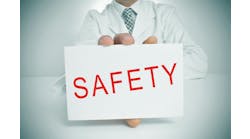The Joint Commission and National Quality Forum (NQF), two prominent organizations in healthcare quality and patient safety, have announced the recipients of the 2020 John M. Eisenberg Patient Safety and Quality Awards.
The 2020 award recipients include a national initiative that has saved more than 1,500 lives by expanding the availability of naloxone, an Illinois hospital’s Academy for Quality and Safety Improvement, and an anesthesiologist who has made seminal contributions in patient safety research, innovation and dissemination.
The patient safety awards program, launched in 2002, honors the late John M. Eisenberg, M.D., former administrator of the Agency for Healthcare Research and Quality (AHRQ), and an impassioned advocate for healthcare quality improvement, according to Joint Commission and NQF leaders.
Initiatives were recognized in three categories:
• Innovation in Patient Safety and Quality at the National Level – Veterans Health Administration (VHA) Rapid Naloxone Initiative, Washington, D.C.
• Innovation in Patient Safety and Quality at the Local Level – Northwestern Medicine Academy for Quality and Safety Improvement, Chicago, Ill.
• Individual Achievement – David M. Gaba, M.D, staff anesthesiologist and director of the Patient Simulation Center of Innovation, VA Palo Alto Health Care System, California, and professor, Anesthesiology, Perioperative and Pain Medicine, and associate dean for Immersive and Simulation-based Learning, Stanford University School of Medicine, California
An announcement from Joint Commission and NQF provides more details on each of the winning efforts:
The VHA Rapid Naloxone Initiative has reduced overdose deaths by increasing the rapid availability of naloxone. The initiative includes three elements:
• Providing Opioid Overdose Education and Naloxone Distribution (OEND) to VHA patients at risk for opioid overdose.
• Providing naloxone to Veterans Administration (VA) Police.
• Including naloxone in select Automated External Defibrillator (AED) cabinets.
As a result of these efforts, the OEND program reported over 1,500 overdose reversals with naloxone. The VA Police also reported 132 overdose reversals, and there were six reported overdose reversals with AED cabinet naloxone.
The Northwestern Medicine Academy for Quality and Safety Improvement was developed to prepare individuals, across multiple departments and professions in their health system, to lead quality improvement. The seven-month program teaches quality improvement methods and asks participants to complete a quality improvement project during the program. It also prepares participants to engage in quality improvement efforts and lead quality improvement projects after completion of the program. Over the past eight years, the program achieved the following results:
• 80 teams consisting of 441 individuals have participated, representing a range of specialties, settings and professional backgrounds.
• Overall, 66 percent of teams have improved performance across a wide range of problems.
• Surveys of participants 18 months post-program completion show that a majority (73 percent) have engaged in subsequent quality improvement efforts, and many (43 percent) have led other quality improvement projects and (41 percent) provided quality improvement mentorship.
Meanwhile, Dr. Gaba is honored for his expansive career as an educator, researcher, scholar, physician and institutional leader. Dr. Gaba’s contributions are innovative and lead the field in three areas:
• Invention, use and commercialization of modern mannequin-based simulation.
• Adaptation of Crew Resource Management (CRM) from aviation to use within anesthesiology was adapted by Dr. Gaba’s group in the late 1980s as part of simulation-based training.
• Creation and promulgation of multi-event “cognitive aids” for real-time use in time[1]critical life-threatening situations.
“This year’s Eisenberg Award recipients represent the best of the best in health care quality and safety improvement,” said David W. Baker, M.D., executive vice president, Division of Health Care Quality Evaluation, The Joint Commission. “Their visionary thinking, dedication, and bold initiatives have significantly improved patient care and saved lives.”
The achievements of each honoree will be featured in a special issue of The Joint Commission Journal on Quality and Patient Safety later this summer. The recipients will also be recognized in a virtual awards presentation during the NQF Annual Conference on July 20.


